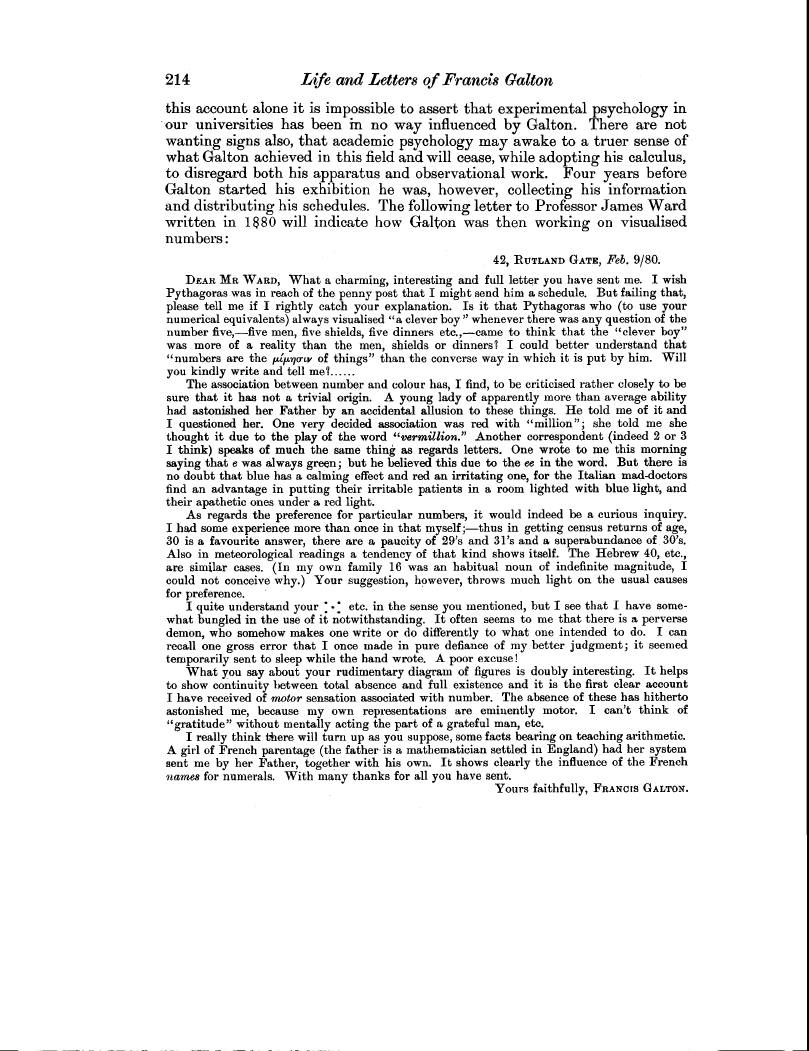214 Life and Letters of Francis Galton
this account alone it is impossible to assert that experimental psychology in our universities has been in no way influenced by Galton. There are not wanting signs also, that academic psychology may awake to a truer sense of what Galton achieved in this field and will cease, while adopting his calculus, to disregard both his apparatus and observational work. Four years before Galton started his exhibition he was, however, collecting his information and distributing his schedules. The following letter to Professor James Ward written in 1$80 will indicate how Galton was then working on visualised numbers
42, RUTLAND GATE, Feb. 9/80.
DEAR MR WARD, What a charming, interesting and full letter you have sent me. I wish Pythagoras was in reach of the penny post that I might send him a schedule. But failing that, please tell me if I rightly catch your explanation. Is it that Pythagoras who (to use your numerical equivalents) always visualised "a clever boy" whenever there was any question of the number five,-five men, five shields, five dinners etc.,-came to think that the "clever boy" was more of a reality than the men, shields or dinners? I could better understand that `"numbers are the µi qo w of things" than the converse way in which it is put by him. Will you kindly write and tell me?
The association between number and colour has, I find, to be criticised rather closely to be sure that it has not a trivial origin. A young lady of apparently more than average ability had astonished her Father by an accidental allusion to these things. He told me of it and I questioned her. One very decided association was red with "million"; she told me she thought it due to the play of the word "vermillion." Another correspondent (indeed 2 or 3 I think) speaks of much the same thing as regards letters. One wrote to me this morning saying that e was always green; but he believed this due to the ee in the word. But there is no doubt that blue has a calming effect and red an irritating one, for the Italian mad-doctors find an advantage in putting their irritable patients in a room lighted with blue light, and their apathetic ones under a red light.
As regards the preference for particular numbers, it would indeed be a curious inquiry. I had some experience more than once in that myself;-thus in getting census returns of age, 30 is a favourite answer, there are a paucity of 29's and 31's and a superabundance of 30's. Also in meteorological readings a tendency of that kind shows itself. The Hebrew 40, etc., are similar cases. (In my own family 16 was an habitual noun of indefinite magnitude, I could not conceive why.) Your suggestion, however, throws much light on the usual causes for preference.
I quite understand your etc. in the sense you mentioned, but I see that I have somewhat bungled in the use of it notwithstanding. It often seems to me that there is a perverse demon, who somehow makes one write or do differently to what one intended to do. I can recall one gross error that I once made in pure defiance of my better judgment; it seemed temporarily sent to sleep while the band wrote. A poor excuse!
What you say about your rudimentary diagram of figures is doubly interesting. It helps to show continuity between total absence and full existence and it is the first clear account I have received of motor sensation associated with number. The absence of these has hitherto astonished me, because my own representations are eminently motor. I can't think of "gratitude" without mentally acting the part of a grateful man, etc.
I really think there will turn up as you suppose, some facts bearing on teaching arithmetic. A girl of French parentage (the father-is a mathematician settled in England) had her system sent me by her Father, together with his own. It shows clearly the influence of the French names for numerals. With many thanks for all you have sent.
Yours faithfully, FRANCIS GALTON.

